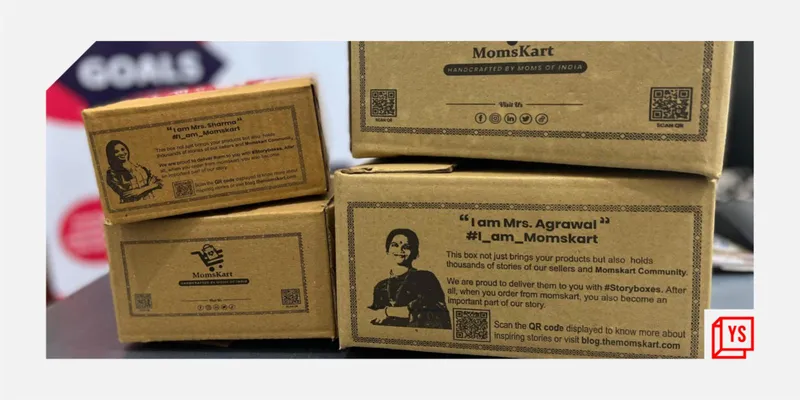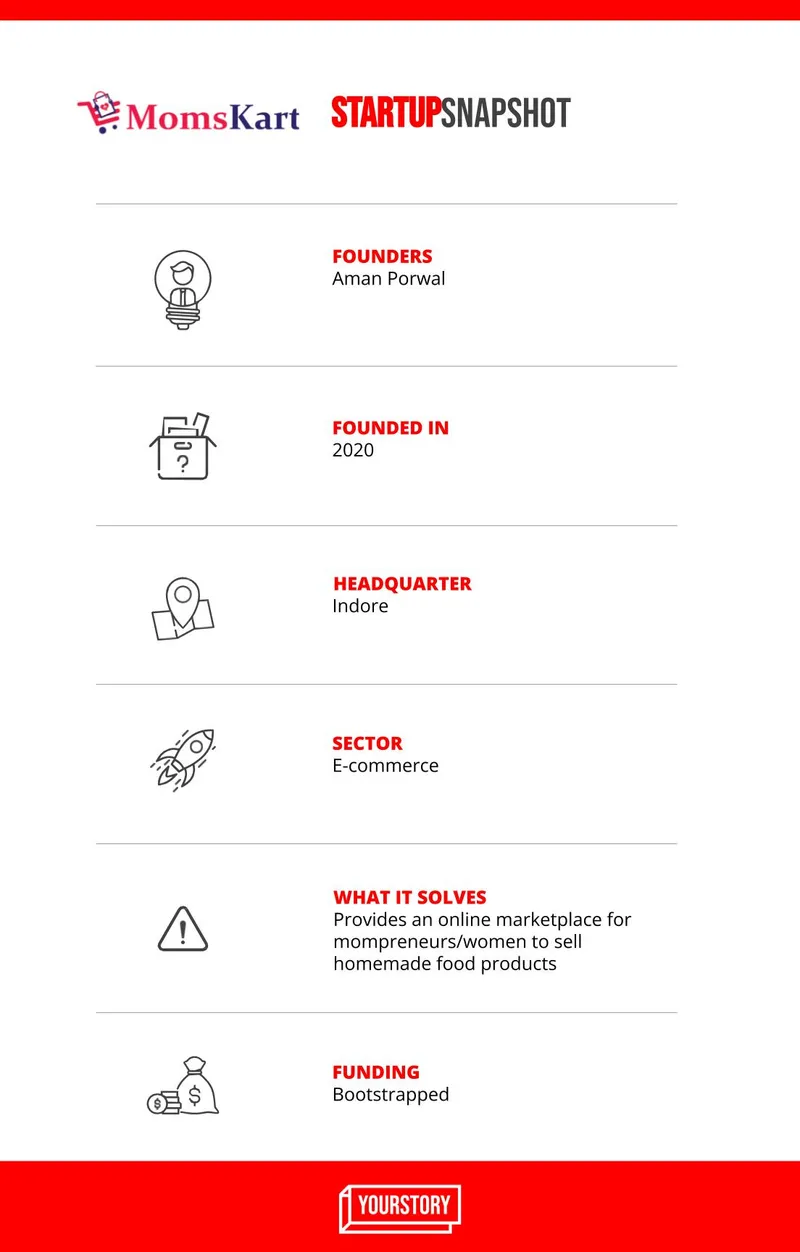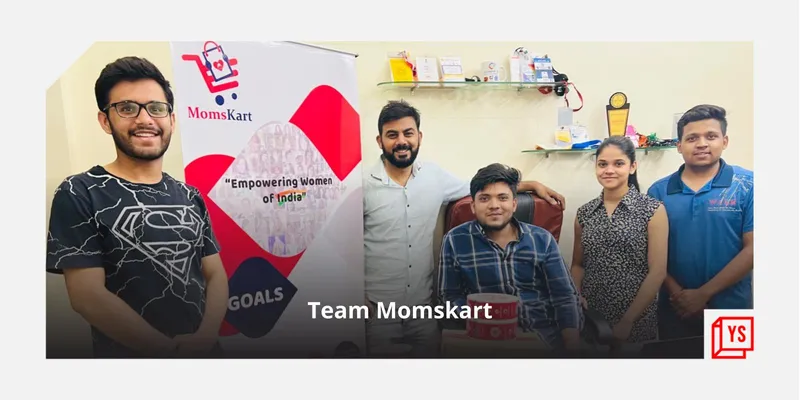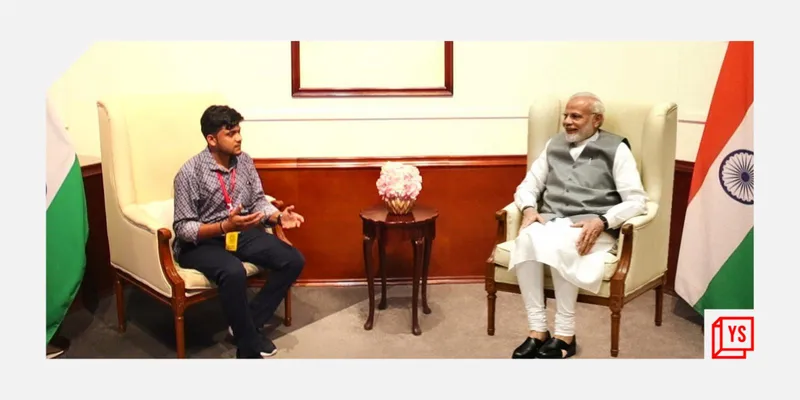[Startup Bharat] Indore-based MomsKart is helping over 500 mompreneurs sell homemade food products
Launched in 2021, MomsKart has about 1,000 homemade non-perishable food products listed on its platform, with over 500 women sellers and a community of over 5,000 bloggers.
Twenty one-year-old Aman Porwal grew up seeing his mother balance the role of a parent and an entrepreneur seamlessly. The sense of pride and joy in her eyes had prompted the engineer to help his mother’s homemade snacks reach a wider audience.
To begin with, he created a small website and a social media page by the name mom made namkeen wala, and started listing food items made by his mother at home. The success of the platform got Aman thinking how it can help more such mompreneurs connect and monetise their homemade food products like pickles, jams, and snacks, in a much organised manner.
Soon, the platform started for his mother turned into a community of over 500 mompreneurs from various states selling their homemade food products across the country.
These were the sowing seeds of , an ecommerce marketplace selling homemade food items made by mothers. These include non-perishable products like pickles, jams, and snacks, with a minimum shelf life of 25 days.

The startup bug
The evolution of MomsKart from mom made namkeen wala involved a hustle of almost two years for Aman, who was on a constant learning curve.
The entrepreneurial bug had caught the engineer young during his computer science engineering days at Acropolis Institute of Technology and Research, Indore. He was introduced to the e-cell during his first year, and was instantly excited about the startup space.
“I was completely hooked on to the culture and the passion of entrepreneurs. I never missed a seminar, guest lecture, or a workshop around startups, and was determined to do something of my own since the very beginning,” says Aman.
The founder shares an interesting story about his first “informal venture”. Aman had got together a group of juniors to do assignments/projects for final year students, who often missed their lectures owing to preparation of various exams. “I made my entire engineering fees out of that business,” quips Aman.
Instead of being scolded or punished on being caught, Aman was applauded and encouraged by his e-cell professors for daring to do business. “In a way, this gave me a sense of confidence and motivation to make it to the startup world,” he adds.
In the second year of graduation, Aman developed a recyclable baby diaper solution that got featured in the top 25 innovation organised by the Confederation of Indian Industries (CII).

A feedback loop
It took almost two years for Aman to bring MomsKart to the market last year, after he decided to expand mom made namkeen wala in 2019. He managed to loop in one of his childhood friends and a software engineer, Shubham Jain, to build the tech, while Aman took care of the product. Shubham is the Chief Technology Officer (CTO) at MomsKart.
“We aggressively worked on building and improving the platform by introducing a feedback loop. I participated in summits, events, and startups pitches, spoke with a lot of experts, and improved on the product till the time we were confident enough to launch it in the market,” says Aman, who pursued various certification courses around technology simultaneously to gain better understanding.
Through these events, the team won a sizable amount of cash and credit prizes worth $10,000, that was utilised to build Momskart. In 2021, the startup managed to make it to the top 250 startups (out of 85,000 applications) in Shark Tank India.
The platform onboarded its first seller from Indore in 2020. Once the platform was ready, the team started approaching mompreneurs through word-of-mouth and social media. In a span of two to three months, it had onboarded about 25-30 sellers, and the network kept growing. Today, it has sellers from pan-India, including Jammu and Kashmir, Chennai, Jamnagar and Darjeeling.
“We approached Mahila Griha Udyog and other such self-help groups that involve 10-15 women working on handmade/homemade products. We help them directly sell on our platform and build their own brand, instead of going through intermediaries,” says Aman.

Business and revenue model
According to the founder, MomsKart has about 1,000 products listed on its platform, with over 500 women sellers (with additional 1,000 applications in process), and a community of over 5,000 bloggers. It serves about 20,000 pin codes, with the majority of demand coming from audiences in the metro cities “craving for homemade authentic local food products”.
The startup has set a certain benchmark for onboarding sellers and their products, and the due diligence is carried out by the team. Once the sellers download the app, they need to go through basic formalities like documentation, complete their profile, and undertake training (how to use the app, packaging, marketing, finance), while the sourcing team carries out quality assessment of the products.
“We are trying to bring in standardisation in terms of quality and packaging of the product, and hence have set some benchmarks before going ahead with a seller,” says Aman.
For now, the startup doesn’t charge any fee for sign-ups or training given to the sellers.
They are able to list and sell their products for free up to a particular sale of point, and are charged a monthly transaction fee thereafter.
The second source of revenue for the startup comes from the commission charged from third party vendors, including logistics, packaging, marketing, social media, and so on, offering their services on the seller’s app. There are about 25 such services available on the app.
MomsKart is also exploring the microfinance space and would extend small ticket loans, as a service, to its sellers in future.
“We are big on influencer marketing and have tied up with over 5,000 bloggers. We have also created a separate social media handle to share inspiring stories of women entrepreneurs on our platform, to keep the motivation and momentum going,” the founder says.
The startup also offers a three month-internship programme, where the interns are tasked to carry out research and market analysis around mompreneurs. This is just a way to discover and add more mompreneurs to its network.

Aman Porwal meeting Prime Minister Narendra Modi at The India Pavilion at EXPO 2020 Dubai
Market analysis and USP
There are various platforms, including Shopify, Dukaan, Instamojo, Bikayi, and Udaan, that allow users to sell products online and kickstart their ecommerce journey.
Popular websites like Amazon and Flipkart have been in the business for years. In addition to that, there are various mompreneurs groups around the country that help women find the right resources and start their small-scale business online.
What sells for MomsKart is its targeted sellers —‘mompreneurs’, particularly in Tier II,III, and IV regions. It is aiming to play on the large community/network of mompreneurs and target a wider audience.
“The aim is to connect regional authentic products on a single platform while empowering women in smaller regions. Our platform has the potential to indirectly employ about one million women in the next three years, particularly through Mahila Griha Udyog,” says Aman.
Future plans
Besides adding lending services to its platform, MomsKart is looking to add new products beyond food such as handmade toys, handicrafts, jewellery, furniture, and so on.
The startup also plans to tie up with the government and corporates, under their CSR policies, to sell products through its platform.
It currently tanks a Monthly Recurring Revenue (MRR) of about Rs 2-2.5 lakh ($2,000-3,000), and clocked Rs 15,27,491 ($20,000) in revenue in FY21. MomsKart has a remote team of 10 people at present.
“We are targeting a monthly sale of minimum 50,000 per seller, and are looking to raise external funding this year,” says Aman, who has invested about Rs 10-15 lakh in the startup.
Edited by Megha Reddy


![[Startup Bharat] Indore-based MomsKart is helping over 500 mompreneurs sell homemade food products](https://images.yourstory.com/cs/2/628912e0d7f211eb8e8307e5b6451cf7/Momskartfeature-1651762038055.jpg?mode=crop&crop=faces&ar=2%3A1&format=auto&w=1920&q=75)
![[Startup Bharat] This Kolkata-based platform is bringing Bengal's indigenous snacks to your home](https://images.yourstory.com/cs/2/e641e900925711e9926177f451727da9/CopyofImageTaggingNewBrandingEditorialTeamMaster1-1649342751447.jpg?fm=png&auto=format&h=100&w=100&crop=entropy&fit=crop)
![[Startup Bharat] Indore-based Shootih is helping SMEs and MSMEs invest their idle money](https://images.yourstory.com/cs/2/f49f80307d7911eaa66f3b309d9a28f5/Featureimages-newdeck-1650893428365.jpg?fm=png&auto=format&h=100&w=100&crop=entropy&fit=crop)




